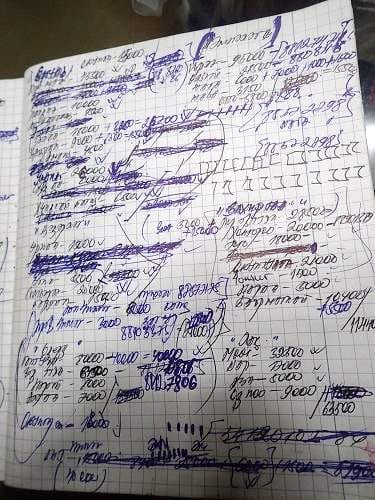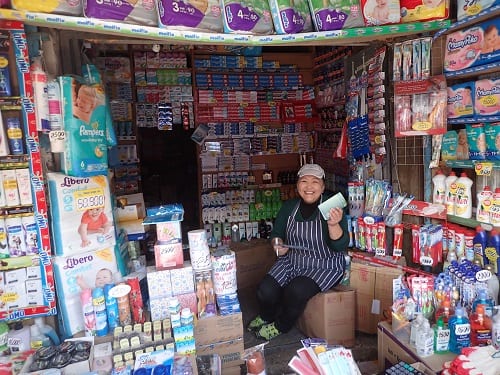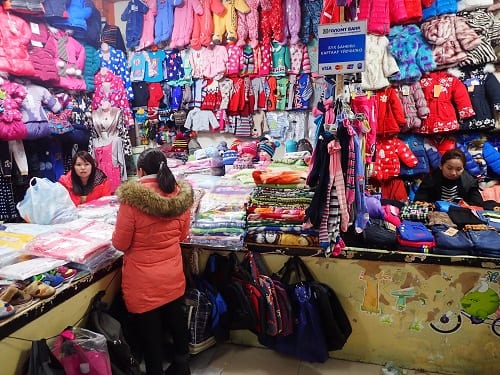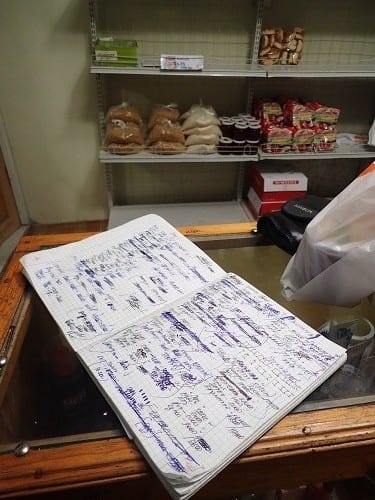Living on Loans
By ucsawat, on 22 January 2016
This is the second blog post in a series about debt and loans.
Because of its history with debt, Mongolian culture contains sayings on its negative moral implications. The saying mentioned in Rebecca Empson’s blog entry, ‘Өргүй бол баян, өвчингүй бол жаргал’ (‘To be without debt is to be rich, to be without illness is to be happy), alludes to the widespread indebtedness of Mongolians to Qing-era traders in the 18th and 19th centuries. The contemporary Mongolian word for ‘loan’, zeel, also originated from this period and is derived from the Chinese word for ‘loan with interest’ (jiè) (Wheeler 2004: 232). Yet, the definition (and moral associations) of zeel has changed considerably historically. During the Socialist-era, for example, prohibition of individual property made formal indebtedness difficult. Instead, this era saw the proliferation of lending, borrowing and trading between family members, friendship groups and acquaintances, which were also called zeel. Utilizing networks (tanil tal) to acquire goods and services was a commonplace occurrence (Sneath 2012: 459).
The multiple meanings of zeel
Mongolians are once again deeply in debt, but the meaning of the word zeel (‘loan’) has expanded to adapt to the vagaries of this contemporary economy. At its core, a zeel indicates an exchange of money or goods that has a (sometimes indefinitely) delayed reimbursement. Contrary to Western understandings, zeel does not (predominantly) imply an economic transaction between two parties. In fact, similar to the network-building of the Soviet era, Mongolians are simultaneously involved in over a dozen ‘loans’ in diverse forms like money, dairy products, animals, clothing, and building materials to the bank, their neighbours, their friends, their school, the local kindergarten, etc.
Take the example of Degee, a 31-year-old woman with her own bakery business in the town of Halh-Gol in eastern Mongolia (population roughly 1,687).[i] Like most local small-business owners, Degee took out two currency loans—from the government and from a commercial bank—to finance both her daily expenses (хэрэгцээтэй) and profit-oriented endeavours (үлдэцтэй). Currency turnover is low, she says, so she also engages in a plethora of informal zeel in order to keep her business going in an economically beleaguered community. For example, local government workers, despite having stable jobs, are frequently paid late depending on when the government has money. During this period, many of these workers come to her to get a zeel of goods until their money comes in.[ii] Even the local kindergarten does so, by getting bread and food stuffs from her for the children three times a week to be paid back at the end of the month.
In fact, while talking with Degee in her shop, a herder entered her store. The herder gave Degee dried curds (aarts), in return for a zeel of baked goods she had received—i.e. for having taken bread a few weeks before with a delayed payment. Because of the pastoralist cycle, most herders receive cash during spring, when they can sell the first goods (i.e. wool) produced by their herd that year. Thus, the herder gave her dairy products in order to placate Degee until the herder could pay back the full worth of the baked goods. In addition, the herder left more dried curds at Degee’s bakery, for a third-party woman to pick-up at her convenience. This third lady was a trader, and had brought clothing from China and given them to the herder. The curds, left at the bakery, were a (partial) repayment, like an interest, for this zeel of the clothing.

The messiness of records is emblematic of the messiness of loan networks. Here, Degee lists people in various categories like ‘hospital’ and ‘kindergarten’ and the amount they owe next to them. In the middle is ‘захиргаа’, i.e. government administration. See also Empson 2014.
In this way, the bakery functioned as a shadow repository for wealth to the commercial banks. Degee complained about monthly bank loan interest payments, not because she couldn’t pay them, but they kept her customers from having money to use at her store. In the struggling economy, most earned currency was given to commercial banks as loan payments, leaving little leftover for food stuffs. Yet, a business is more forgiving of late payments than a bank, and thus the bakery and its patrons were enmeshed in a web of loans of various goods, services and IOUs. These messy (sometimes multidirectional) economic exchanges, often intermeshed with currency from banks (or pawnshops), are the current manifestation of zeel (‘loan’) networks in Mongolia.
The Morality of Loans
Consequently, in Mongolia, being in debt is a normalcy. Everyone has a loan, said Degee, after I asked if loans were shameful. According to her, even individuals with steady jobs (like government workers) are paid so sparingly that they need to take out a (bank or individual) loan for any ‘larger’ purpose or occurrence—i.e. a car for the family, a television or medical expenses. Thus, with a steady job as collateral, these families frequently pay interest for a few months, establish good credit with the bank, and extend the loan. With this extended bank loan money, they pay off Degee. In this way, the conclusion of a bank loan gets pushed off into the distant, unseen future. Economic necessity thus breeds the continuation and repeated reopening of bank, pawnshop and interpersonal loans.
Amar, a 28-year-old trouser trader on Ulaanbaatar’s biggest outside market, Narantuul, has a story that corroborates Degee’s narrative. Although Amar works freelance, his wife is employed by the state as a policewoman. Due to vagaries in his earnings, Amar’s wife took out a loan with her steady employment as collateral, in order to pay for their daughter’s kindergarten and her return to university. He lamented that bank loans on the basis of employment (цалингийн зээл) were the most difficult to negotiate, because the salary was too low—stable enough to get a loan, but never enough to pay the loan back fully. Thus, government employee families (like his) became dependent on bank loans for their moderate living standard (as a supplement to their salary). Loans are only morally negative when you can’t pay them back, he says, but even then the requirements and social circumstances can be too difficult. Thus, Amar continues, ‘the failure to pay back a loan is 30 percent the person’s fault and 70 percent society’s fault’.

The chaos and competition of Narantuul, Mongolia’s largest informal market, sinks many traders into informal and formal debt.
Consequently, the moral connotation associated with loans and debt is changing. Although older generations might regard a formal loan as a sign of character failing (as a vestige of Socialism), younger generations engage with the concept differently. Informal market traders like Amar are exposed to daily vagaries and irregularities in income. For them, the inability to pay back a loan looks like a failed dream (and not a reflection of their moral character)—an attempt to expand a business that went bust in a faltering economy. Within this narrative, the locus of control lies outside of the individual and is instead dependent on the whims of government, banks and the economy. To others, debt is shameful when it destroys social relationships—reflecting the trust embedded in interpersonal loans. Yet as the economy continues to fluctuate, debt increasingly normalizes as a feature of everyday life, removing much of its stigma.

A trader of household goods in her container (контейнер) stall on Narantuul. She frequently gives ‘loans’ of goods to neighboring stalls when they run out of product for the day so they can continue business.
The Sociality of Loans
As previously mentioned, loans in Mongolia involve a diverse network of exchange, obligation and transaction between multiple actors, both official and unofficial. Because of the historical prevalence of sharing between kinship groups in Mongolia, anthropologists have referred to these material flows between people as social ‘enactions’—“These sorts of transmissions are so common and expected that they can be seen as materialisations of the social relations themselves, a result of expectations and obligations generated by kinship and friendship connections” (Sneath 2012: 459). Prior to the switch to a market economy, sharing, loaning and borrowing amongst people was common and expressed in terms of duty, favours and obligations between friends and family (459). These material exchanges still exist, yet are increasingly monetized in the interest of profit.
Take the following example of exchange amongst a group of friends: Person A uses a BMW that is owned by their parents. Person B, their friend, has an old Range Rover and wishes to sell it. Unable to find a buyer, Person B brings his car to a pawn shop and pawns it. They both have a friend, Person C, who has a new Range Rover, but now dislikes its fuel consumption. Person B tells Person A about Person C’s problem, who then passes the BMW through Person B to Person C. Person B thus exchanges the BMW to Person C for the new Range Rover. Person B then takes the new Range Rover and sells it to Person D in exchange for money and a Japanese car. All the while, Person B continually pays Person A a small sum of money as a form of interest until they can fully pay off their ‘loan’ for the BMW (which is actually legally owed to Person A’s parents).
Similar to Degee’s small business, kinship and friendship networks increasingly become zeel networks financed through a diverse system of bank loans, barter, pawnshops and trade. Although these exchanges between friends are still frequently couched in terms of ‘favours’ and ‘help’ (тусламж), these favours more and more come with a price. As with this example regarding the BMW, loans of goods or money between friends now commonly involve interest (to make ‘it worth it’, as one informant said), which was unheard of during the Soviet era. Additionally, in the absence of capital to meet their needs, individuals can lease, loan, sell or borrow their family member’s property or take a bank loan out using a family member’s collateral (давхар зээл). In this way, Person A could sell or loan out their parent’s car without repercussion. Thus, in light of the struggling economy, familial and friendship networks take on a new dimension as means for increased capital access (these networks also act as collateral in pawnshop loans—see previous blogpost).
The Monetisation of Trust
The zeel networks were historically based on trust within a small community. For example, Jagaa, a 34-year-old jacket trader on the informal market in Choibalsan, frequently lends and borrows goods and money from the girls on her trading floor. Because of their close working proximity to one another, which results in intertwined friendship networks, the girls will frequently give each other money when in need—i.e. when one of them can’t pay back their bank loan payment that month. Jagaa says that she ‘trusts people’ (хүнд итгэдэг) and thus will unreservedly give out loans of products and money to acquaintances sent by friends. This form of trust in zeel exchange is not uncommon on Mongolia’s contemporary markets—Zola, a 21-year-old, whose family works on Narantuul, explained that once a customer became a regular, ‘trusted customer’ (найдвартай харалцагч), her family will freely send goods to that customer on request to be paid back at leisure. In this way, zeel networks on informal markets, within friends and family have historically been based on trust within a community.

Women (and men) who work in the same section of a market frequently ‘loan’ each other money or goods or will sell goods for each other when one is absent/ill. In this way, they build trust networks amongst each other. The sign reads: “All bank cards accepted here”.
However, as the language of loans shifts from favour to self-interest, so too does trust shift from individual to institution. In the past, formal zeel transactions between people were settled through verbal contracts (амаар хийсэн аман гэрээ), based on communal trust and expectation of obligation fulfilment. Yet, as Jagaa mentioned in our interview, most Mongolians now have an example of the failure of that trust—of being ‘used’ through a zeel and then abandoned (ашиглуулаад л өнгөрдөг). Stories abound of friends being jilted through the lack of a business contract; individuals changing their phone numbers after getting a personal loan; or giving a zeel to a classmate who just disappeared. Promises and informal contracts, unfortunately, do not stand up well in the court of law. Verbal contracts are thus increasingly seen as risky (эрсдэлтэй). In this way, the legal-backing of bank loans gradually become more desirable where interpersonal loans might have been more popular in the past.
The current relationship between trust and commerce institutions (as a buffer for risk) was explained to me as follows: In zeel exchange between close relatives/friends, no interest is taken, but small ‘gifts’ of money are given. In zeel exchange between friends and acquaintances, an interest is taken. In zeel exchanges between strangers, a notarized contract is required. Thus, as the social distance widens, so too does the reliance on institutionalized methods of commerce (see also previous blogpost).
Surviving the Economic ‘Hangover’
Between 2011 and 2015, the GDP growth of the Mongolian economy dropped from 12 to 3 percent. This precipitous decline was recently described by Enkhbold, head of both Parliament and the Democratic Party, as the economic ‘hangover’ after the party (шартдаг үйл явц).[iii] In a beleaguered economy, zeel, in all their various instantiations, become instrumental to everyday economic survival. Far from the individual, strictly institutional monetary exchange envisioned by Western economic policies and bank initiatives, the definition of and implementation of zeel in Mongolia encompasses a wide range of barter, borrowing, exchanging, transferring, giving, pawning, and payment between friends, family, acquaintances, banks, pawnshops and group networks. The boundaries between official, unofficial, trust, obligation, self-interest and profit blur, as neither old forms of trust networks, nor new pecuniary institutions are without risk.
Consequently, whereas others might live from hand to mouth, Mongolians increasingly live from ‘loan to loan’ (зээлээс зээлийн хооронд явдаг), as their social needs are met through the continual opening, fulfilment or extension of diverse forms of zeel to one another. Within this framework, the goal of a loan is not necessarily eventual completion, nor is debt necessarily seen as a sign of character failing. Moreover, as one sum herder stated, getting a loan was like going with the times (Орчин үеээ дагаж өөрчлөгдөж байгаа учраас зээл ч гэсэн авж байна). Loans represent one’s engagement in the negotiation of personal needs through societal relationships, as well as the accrual of money through market turnover and continual payment. Consequently, as the fluctuations of the market economy impact everyday decisions, even the historical practice of kinship and friendship obligation become defined through the language of market, exchange, profit and interest.
References:
Empson, Rebecca 2014 An Economy of Temporary Possession (available on-line: http://www.lse.ac.uk/newsAndMedia/videoAndAudio/channels/publicLecturesAndEvents/player.aspx?id=2461)
Sneath, David 2012 The ‘age of the market’ and the regime of debt: the role of credit in the transformation of pastoral Mongolia, Social Anthropology/Anthropologie Sociale (2012) 20, 4 458–473.
Wheeler, Alan 2004 Moralities of the Mongolian ‘Market’: A Genealogy of Trade Relations and the Zah Zeel, Inner Asia (2004) 6: 215-38
[i] http://khalkhgol.dd.gov.mn/мастер-төлөвлөгөө
[ii] In her 2014 public lecture “An Economy of Temporary Possession”, Empson notes that locals do not refer to these exchanges as ‘loans’, but occasionally as ‘milk money’. However, in Empson’s example, locals were engaging in barter where no money was exchanged. Degee, in contrast, always used money as a base and never accepted full payment in goods. Thus, she continued to use the language of ‘loan’, thus indicating her conceptual linkage between currency and loan giving. The recording is available at: http://www.lse.ac.uk/newsAndMedia/videoAndAudio/channels/publicLecturesAndEvents/player.aspx?id=2461
[iii] http://dnn.mn/з-энхболд-уих-ипотекийн-найман-хувийн-зээлийн-асуудлыг-энэ-сардаа-шийдвэрлэнэ/
 Close
Close





